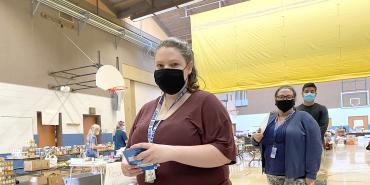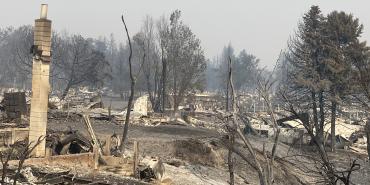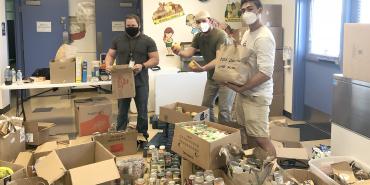When wildfires in Oregon spread across the state in early September, burning more than 1 million acres, more than 500,000 Oregonians were under some level of evacuation notice, including thousands of Oregon School Employees Association members who were forced from their homes. As communities and homes continue to be threatened by fire, with many people still evacuated and seeking food and emergency shelter, OSEA is stepping up to help its members.
The wildfires have affected communities throughout the entire state of Oregon, from areas in the north around Portland to cities closer to the California border like Ashland and Medford. In places like the southern Oregon towns of Phoenix and Talent, the school buildings are intact but the communities are devastated. OSEA and the school district have been working together to reach out to families who were displaced to identify their needs.
Christie Sanders, president of Phoenix-Talent Chapter 96, says the wildfire swept through the area on Sept. 8, the first day of school. Although the fire has been contained, the majority of the houses and mobile homes were destroyed and 80 percent of the families in the community have been displaced, says Sanders. “It literally looks like there was a nuclear bomb that went off in the area where the fire was,” says Sanders.
The Phoenix-Talent school district is home to a number of small blue-collar communities with a large population of migrant workers, some of whom are undocumented. Nearly 40 percent of the student population in the school district is Latino. OSEA is providing information in Spanish and helping those who may be nervous about trying to access government resources. To address a pressing need for evening and weekend meals, OSEA and the AFT are working with the World Central Kitchen and the Clinton Foundation to supplement the USDA breakfast and lunch meals currently provided to the school district’s families who qualify for free lunch distributed at school sites.
Sanders says even though many of her members have lost everything, they are coming together to support one another. A pool of volunteers—classified and certified staff—are working at distribution locations seven days a week to hand out meals and other supplies. Meanwhile, more classified staff have volunteered to shop for supplies and deliver them to families that cannot come to the distribution locations. Another group of classified and certified staff provides an activity area for children at the county fairgrounds, which serves as a shelter for displaced families. “Parents can drop their kids to play and have activities while they go do the paperwork to get help from the Red Cross and FEMA [the Federal Emergency Management Agency] and not have to worry about them,” says Sanders.
Sarah Wofford, the president of Rogue Community College Chapter 152 and the OSEA Zone 5 director, has been touching base with members in southern Oregon as well. “I’m making phone calls and where I can, knocking on doors,” she says. Wofford is focused on building a coalition between all of the counties that were impacted in southern Oregon. The goal is to help the community long term. “We’re going to sit down and try and figure to it out. It’s about helping to rebuild the entire community.”
“The fires are contained, but the damage is far from over,” she says. “We’re all still in shock. Once the adrenaline wears off, that’s when we’ll all start to see the real loss, when people stop stepping up to help. That’s where unions and organizations like this will need to come into play.”
Lisa Gourley, OSEA’s president and an AFT vice president, says field staff and board members have been working to get checks from the member assistance program out to members. OSEA represents more than 23,000 individuals. Gourley says her union is still assessing how many members have been affected by the wildfires. “We have no idea how many people were displaced, but the fires are still burning and communities continue to be decimated. Their local businesses and services are gone. It will be years before they recover. People are helping out to organize and do what they can. We really don’t know what the next steps will be—this level of community devastation and loss is unfamiliar territory. We are just taking it one day at a time.”
That fact that her members have stepped up to help their community is part of their caregiving nature, says Gourley. “That’s who classified people really are,” she says. “They take jobs that are a community service. I’m so proud of them and the work they do; it’s difficult to put into words the incredible level of generosity and kindness they have.”
Sanders agreed: “Our families need our support. It’s just what we do. We go above and beyond and take care of each other. We are going to rise up and make this better. It’s just what’s going to happen, and nothing’s going to stop us.”
The AFT Disaster Relief Fund is accepting donations to help those displaced by the fires, and OSEA has created a Wildfire Resources page with links to places to donate to fire victims around the state.
[Adrienne Coles]



